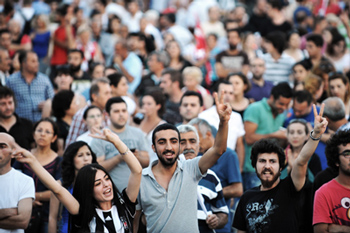(front page)
Mass protests across Turkey
press for democratic rights

|
|
AFP/Getty Images/Ozan Kose
|
| Thousands demonstrate June 11 in Izmir, Turkey, against government repression. Riot cops dispersed anti-government protesters in Istanbul same day with rubber bullets and tear gas.
|
BY SUSAN LAMONT
Two weeks into large anti-government demonstrations in Istanbul and across Turkey, Prime Minister Recep Tayyip Erdogan is straining to end a budding protest movement without exacerbating the political crisis it is creating for the country’s capitalist rulers. The actions remain largely composed of students, middle-class professionals and various political opposition groups. But they have also won support from many workers and unions, which are stepping into the fray with their own demands.
The demonstrations are a sign of growing confidence among working people and their allies to press for greater rights and space for political discussion, debate and organization. The protests follow just a few weeks after a union-organized May Day demonstration in Istanbul was dispersed through police repression. Tens of thousands turned up, despite a government ban.
Erdogan, who initially downplayed the demonstrations and has denounced participants as looters and terrorists, agreed on June 10 to meet with representatives from the growing protest movement.
But a day later riot police, using tear gas and water cannons, stormed Taksim Square to clear the area of banners and placards, bulldozing homemade barricades erected by protesters. The square is within Gezi Park, where demonstrations in Istanbul have been centered. Protesters encamped elsewhere in the park were not targeted.
So far, three people have died, more than 5,000 injured and thousands arrested since the protests began. The government says 600 police have been wounded.
The wave of demonstrations was sparked by a May 31 police attack against a peaceful occupation at Taksim Square by young people trying to reverse Erdogan’s plan to demolish part of Gezi Park to erect a new Ottoman-style building, complete with a shopping mall — a move seen by many as an affront to national patrimony.
Repression spurs resistance
New protests sprang up in response to the crackdown, drawing in tens of thousands. Demands broadened to include more democratic rights, protections for religious and national minorities and women, and even for Erdogan and other government officials to step down. The KESK (Confederation of Public Workers’ Unions) and DISK (Confederation of Progressive Trade Unions) carried out strikes June 4-5 and joined demonstrations.
The forces and demands they put forward are disparate and include allusions to the diffuse “Occupy” protest movement of 2011-2012 in the United States and other countries.
There have been large demonstrations in Ankara, the capital, and more than 70 other cities. “At night, people who don’t come out to the protests go to their balconies, and bang pots and make noise, turn their lights off and on, to show their support for the demonstrators,” Semsa Yegin, a writer and translator, told the Militant.
“We are in Taksim Square for our own demands,” said Cafer Alp, an electrician and DISK representative, in a telephone interview from Istanbul. DISK is one of Turkey’s largest trade union confederations, organizing more than 400,000 workers with 17 affiliated unions, including the Textile Workers Union.
The Erdogan government has enacted legislation aimed at weakening the unions, Alp said, citing increased use of subcontractors, working without job security, and measures that make it harder for unions to organize. “I haven’t seen such solidarity and unity in a long time,” he said. “It gives hope to workers and laborers.”
The unions are planning big demonstrations June 14 to commemorate a workers’ uprising in June 1970 and are trying to involve Kurdish organizations and environmentalists, as well as workers, in the actions.
The Erdogan government has responded with both repression and relaxation as it reacts to a new political situation in the country and broader region. Earlier this year, an agreement to end decades of conflict between the Kurdistan Workers Party and the Turkish government included limited, but unprecedented, language and other rights for Kurds, registering gains won by the oppressed Kurdish people and a political opening for toilers. In January thousands of books banned in Turkey over the decades were allowed to return to bookstore shelves, including The Communist Manifesto.
Erdogan, a former mayor of Istanbul, helped found the Islamist Justice and Development Party (AKP) in 2001. He became prime minister two years later, running on a moderate populist platform. His administration has focused on taking steps to advance Turkey’s bid to join the European Union and other steps in the interest of the propertied rulers, including an aggressive privatization program to reduce state involvement in basic industry, banking, transport and other economic sectors.
Turkey’s capitalist economy has improved somewhat in the last decade, with average per capita income tripling. Erdogan, now in his third term, takes the credit for the economic successes, which laid the basis for years of apparent political and social stability. This earned the new party support from a substantial section of the capitalist class in Turkey, as well as the title “model democracy” from the mouthpieces of their brethren in the imperialist nations of Europe and America.
The Islamist draping of the AKP forms the channel for its populism. In its appeals for support among the country’s Muslim majority, it has departed from the “secularism” of previous ruling parties, loosening anti-democratic laws aimed at those with religious beliefs, while at the same time imposing anti-democratic strictures in the name of Islam. These include rolling back certain bars on Muslim women’s right to wear head coverings, and on the other hand, limiting access to abortion and restricting alcohol sales.
Yasemin Aydinoglu in Elmira, New York, contributed to this article.
|



